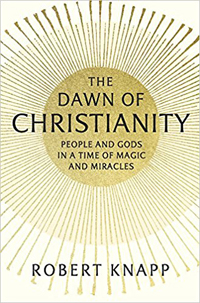 Robert Knapp, The Dawn of Christianity: People and Gods in a Time of Magic and Miracles (Cambridge: Harvard University Press, 2017), 303pp.
Robert Knapp, The Dawn of Christianity: People and Gods in a Time of Magic and Miracles (Cambridge: Harvard University Press, 2017), 303pp.
In an earlier book called Invisible Romans (2011), the classicist Robert Knapp of Berkley explored history from the bottom up, as experienced by the ordinary citizens of the Roman Empire — laborers, housewives, prostitutes, freedmen, slaves, soldiers, and gladiators, as opposed to the top down history that we usually get from the perspectives of the intellectual elite and the economically powerful who left us a literary legacy — emperors, philosophers, and senators. In this new book he follows a similar methodology, trying to tease out what early Christianity looked like among the vast majority of the ordinary faithful as it emerged from a cultural context of Jewish monotheism and pagan polytheism. In his estimation, the highly educated elite composed about one per cent of the population. There was also a semi-literate populace of artisans and merchants, and then the vast majority who were even less literate.
Why would a person change allegiance from Judaism or polytheism? That sort of change would be very disruptive to families, community, and society at large. And make no mistake, Christianity "demanded fundamental change in a person's supernatural allegiance." The primary path to change was some version of "show me the power," that is, "demonstrated access to the supernatural powers." And that's just what Jesus did. He was a prophet and also a charismatic leader, but also much more: he claimed not just to speak for Yahweh, he claimed to be one with Yahweh (a blasphemy for Jews). Jesus thus "sowed seeds of hostility by claiming divine authority." In Paul's language, to the Jews he was a stumbling block and to the Greeks foolishness.
And thus a historical paradox. On the one hand, the emergent Christian message was powerfully appealing to ordinary citizens, so much so that today it is easily the largest religion in the world. On the other hand, it simultaneously attracted its fair share of critics from those same beginnings. Tacitus famously called them "haters of mankind," while Pliny the Elder worried that the contagion was spreading like wildfire. After three centuries, there came a remarkable historical paradox: the greatest persecutor of the church (the Roman state) became its biggest supporter (Constantine) and the center of its ecclesiastical power (the Roman papacy).


